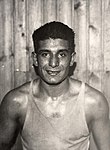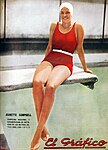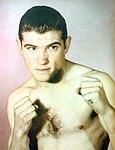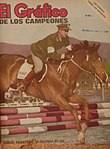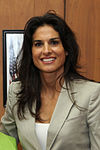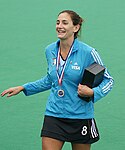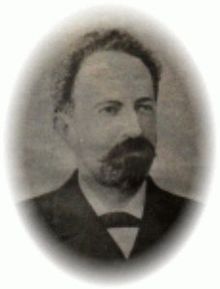Olympic history of Argentina
|
|
|
|
|---|---|---|
| 21st | 25th | 28 |
Argentina , whose NOK , the Comité Olímpico Argentino , was founded in 1923, has been sending athletes to the Olympic Games since 1900. They did not take part in the Summer Games in 1904, 1912 and 1980 and in the Winter Games in 1924, 1932, 1936 and 1956.
With two silver and two bronze medals each, the hockey player Luciana Aymar and the sailing athlete Carlos Espínola are the athletes with the most medals.
Overview
Summer games
1900 to 1912
Argentina's first Olympian was the sword fencer Francisco Camet , who competed in Paris on June 1, 1900 . Camet was the only athlete on the Argentine team. After St. Louis in 1904, no team was dispatched. Argentina also did not take part in the 1906 Olympic Intermediate Games in Athens . In London in 1908 Argentina was represented by the figure skater Horatio Torromé . Figure skating was part of the Olympic program in 1908 and 1920. Argentina decided not to participate in Stockholm in 1912.
1920 to 1936
In 1920 in Antwerp, the Argentine Olympic team consisted of only one participant, the boxer Ángel Rodríguez. 77 athletes traveled to the 1924 Paris Games to compete in athletics, boxing, cycling, fencing, polo, rowing, sailing, shooting, swimming, tennis and weightlifting. The first medal wins could be celebrated in Paris. On July 12, 1924, the national polo team became Argentina's first medalist and Olympic champion after winning four games. The athlete Luis Brunetto became the first Argentine medalist in an individual sport with his silver medal in the triple jump. The boxing team was able to contribute four more medals. Silver medals were won by the lightweight Alfredo Copello and Héctor Méndez in the welterweight division. Pedro Quartucci won bronze in the featherweight division and Alfredo Porzio in the heavyweight division. The foil fencer Roberto Larraz delivered further top results with his fifth place in the individual ranking, the weightlifter Carlos Bergara with the fifth place in the light heavyweight division and the marksmen Lorenzo Amaya and Matías Osinalde with fourth and fifth place with the rapid fire pistol.
The games in Amsterdam in 1928, where Argentinian wrestlers, riders and soccer players competed for the first time, were even more successful for Argentina. On August 9, 1928, the swimmer Alberto Zorrilla became the first Olympic champion in an individual sport. Two days later the boxers Víctor Avendaño in the light heavyweight division and Arturo Rodríguez Jurado in the heavyweight division also became Olympic champions. Two other boxers won silver, Víctor Peralta at featherweight and Raúl Landini at welterweight. The national soccer team also won silver. In the final, she lost 2-1 to Uruguay in a replay. The first final game ended 1: 1. The bronze medal in fencing was won by the foil team with Roberto Larraz, Raúl Anganuzzi , Luis Lucchetti , Héctor Lucchetti and Carmelo Camet , son of the first Olympic athlete Francisco Camet. Argentina secured the medal with an 11: 5 over Belgium.
The participation in Los Angeles four years later was also successful. Featherweight boxers Carmelo Robledo and heavyweight Santiago Lovell became Olympic champions, as did marathon runner Juan Carlos Zabala . Amado Azar was able to win a silver medal in the middleweight division of the boxing tournament . The athletes Carlos Bianchi with 5th place over 200 meters and Federico Kleger with 6th place in the hammer throw delivered further top results.
The Argentine national polo team celebrated their second Olympic victory in Berlin in 1936. Boxer Oscar Casanovas became Olympic featherweight champion. There was also a silver medal from Guillermo Lovell in the heavyweight division and two bronze medals from Raúl Villareal in the middleweight division and Francisco Resiglione in the light heavyweight division. The swimmer Jeanette Campbell , the first woman in an Argentine Olympic team, won silver in the 100 meter freestyle. The rowers Horacio Podestá and Julio Curatella won bronze in the uncontrolled two. Juan Carlos Zabala , marathon winner from 1932, competed in Berlin in the 10,000 meter run and finished sixth. He had to give up the marathon after a fall just halfway through the race. The men's 100-meter relay finished fourth one second behind Germany. The Wiking boat finished fourth in the 6-meter class.
1948 to 1960
After the end of the Second World War , the Summer Olympics were held in London for the first time in 1948. Argentina sent 199 athletes, including for the first time gymnasts, modern pentathletes, a basketball team and a hockey team, the largest team to date to the Olympic Games. Again three gold medals could be won. The track and field athlete Delfo Cabrera won the marathon, who was able to overtake the Belgian Étienne Gailly , who had been in the lead up to that point, on the final lap in the stadium. The boxers Pascual Pérez in the flyweight and Rafael Iglesias in the heavyweight division also became Olympic champions. The long jumper Noemí Simonetto won the silver medal, as did the marksman Carlos Enrique Díaz Sáenz Valiente with the rapid-fire pistol and the sailors in the 6-meter class with the boat Djinn . The boxer Mauro Cía also won bronze in the light heavyweight division. The marathon runners Eusebio Guiñez in 5th place and Alberto Sensini in 9th place achieved further top positions. Alberto Triulzi crossed the 110 meter hurdles in fourth. The swimmer Mario Chavez also took fourth place over 100 meters back.
123 athletes traveled to Helsinki for the 1952 Games. Tranquilo Cappozzo and Eduardo Guerrero became Olympic champions in rowing in double sculls. Reinaldo Gorno won the silver medal in the marathon. Defending champion Delfo Cabrera finished sixth. Sprinter Gerardo Bönnhoff also finished sixth in the final over 200 meters. Boxer Antonio Pacenza won silver in the light heavyweight division and his teammate Eladio Herrera won bronze in the light middleweight division. Another bronze medal was won by the weightlifter Humberto Selvetti in the heavyweight division. The basketball team lost in the game for bronze Uruguay with 59:68. In the 1000 meter time trial, Clodomiro Cortoni came fourth, as did the military rider Pedro Mercado on his horse Mandinga , the boat Pampero in the kite class in sailing, the marksman Carlos Enrique Valiente with the rapid fire pistol and the welterweight freestyle wrestler Alberto Longarella.
The equestrian competitions of the 1956 Olympic Games had been relocated to Stockholm due to the strict quarantine regulations for horses in Australia . Here the Argentine show jumping team took 4th place. In Melbourne two athletes won medals. After bronze in 1952, weightlifter Humberto Selvetti now increased to silver in the heavyweight division. The boxer Víctor Zalazar won bronze in the middleweight division. The boat Pampero repeated fourth place in the kite class in sailing from 1952. The marksman Oscar Cervo achieved fifth place with the rapid fire pistol.
In Rome in 1960 too, Argentina only won two medals. The crew of the boat Tango won silver in the kite class in sailing. In the 5.5 m class, the Ardilla reached fourth place. The lightweight boxer Abel Laudonio won the bronze medal. In Rome, a female diver from Argentina competed for the first time.
Rafael Iglesias (r.) Won the heavyweight gold medal in 1948 through knockout over Sweden's Gunnar Nilsson
Silver in 1952 in the marathon for Reinaldo Gorno (on the left the winner Emil Zátopek from the CSSR)
1964 to 1980
1964 in Tokyo, where Argentine judoka took part for the first time, the rider Carlos Moratorio won the silver medal with his horse Chalan . It remained the only medal for the Argentine team in Tokyo. The cycling team passed the medals in the team time trial over 100 km in 4th place. The rower Alberto Demiddi also finished fourth in the single.
In Mexico City 1968 Alberto Demiddi was able to improve to 3rd place and thus win a bronze medal. The boxer Mario Guilloti was able to win another bronze medal in the welterweight division.
Alberto Demiddi was able to improve again in 1972 in Munich, this time he won silver in the single. There were no further placements in Munich.
In Montreal 1976 Argentina was medalless for the first time since 1920. The only top placements were 5th place in the judo tournament by Jorge Portelli in the open class and 6th place in the single class by the rower Ricardo Ibarra .
Argentina followed the US boycott in 1980 and stayed away from Moscow.
1984 to 1996
Argentina was first represented in canoeing and volleyball in Los Angeles in 1984. As in 1976 in Montreal, the team was unsuccessful. In cycling, Juan Esteban Curuchet reached 5th place in the points race, his teammate Marcelo Alexandre was sixth in the sprint. Rower Ricardo Ibarra was able to improve to 5th place in the single.
In Seoul in 1988, archers and table tennis players from Argentina could take part for the first time. After a break of 16 years, medals were won again. In tennis, Gabriela Sabatini was defeated by the German Steffi Graf in two sets and thus won silver. The men's volleyball team won bronze with a 3-2 after sets over Brazil. The cyclist Juan Esteban Curuchet was able to repeat his fifth place in the points race. In sailing, windsurfer Jorge García came in 7th.
A bronze medal was the result in Barcelona in 1992. Javier Frana and Christian Miniussi lost in tennis doubles to the later Olympic champions Boris Becker and Michael Stich with 2: 3 in sets. In the sprint of the track cyclists, José Lovito reached 6th place. The rower Sergio Fernández also achieved a sixth place in the single.
In 1996 in Atlanta, the Argentine U23 soccer team won silver after losing 3-2 in the final against Nigeria. The sailor Carlos Espínola also won silver in windsurfing. Boxer Pablo Chacón won bronze at featherweight. Beach volleyball players from Argentina took part for the first time in Atlanta. The Taekwondoin Gabriel Taraburelli was fourth in the flyweight division. The men's national volleyball team also came in fourth. In the bronze medal she lost to Italy 3-0 in sets.
2000 until today
In Sydney 2000 Carlos Espínola was able to win silver again in windsurfing. The sailors contributed two bronze medals by Javier Conte and Juan de la Fuente in the 470 and Serena Amato in the Europe class. The women's national hockey team won the silver medal after losing 3-1 in the final to Australia. For the first time, Argentine taekwondo and triathletes started. The canoeist Javier Correa achieved 5th place in the kayak single over 1000 meters.
After 52 years Argentina was able to celebrate Olympic victories again in Athens in 2004. The men's national basketball team won its final against Italy 84:69. In the semifinals, the US team was defeated 89:81. In the Olympic football tournament, Argentina beat Paraguay 1-0 in the final. The women's national hockey team won bronze with a 1-0 victory over China. Other bronze medals were won by Carlos Espínola and Santiago Lange in sailing in the tornado class, swimmer Georgina Bardach in the 400 meter medley, and tennis players Paola Suárez and Patricia Tarabini in women's doubles. The rower Santiago Fernández was fourth in the first.
In Beijing in 2008, the men's U23 national football team defended their Olympic victory. In the final, Nigeria was defeated 1-0. The racing cyclists Walter Pérez and Juan Esteban Curuchet became Olympic champions in Madison. Curuchet won his gold medal on his sixth Olympic participation. At the age of 43 he is still the oldest Olympic champion in cycling. The Argentine national basketball team was unable to defend its 2004 Olympic victory. In the semifinals, she lost to the USA with 81: 101. In the bronze medal match, Lithuania was beaten 87:75. The women's national hockey team also won bronze, after Athens for the second time in a row. The team beat Germany 3-1 in the bronze medal match. In sailing the Tornado class, Santiago Lange and Carlos Espínola were bronze, as in 2004. In judo Paula Pareto won bronze in the extra light weight.
In London 2012 there was an Olympic victory in Taekwondo by Sebastián Crismanich in the welterweight division. After silver in 2000 and two bronze medals in 2004 and 2008, there was again silver for the women's national hockey team in London. In the final, the Netherlands were beaten 2-0. Luciana Aymar has been in all tournaments since 2000 . Together with the sailor Carlos Espínola, she is the most successful Olympic participant in Argentina with four Olympic medals. The sailors Lucas Calabrese and Juan de la Fuente won bronze in the 470 class. Tennis player Juan Martín del Potro won another bronze medal in the men's singles. In the game for bronze he was able to defeat the Serb Novak Đoković in two sets . The Argentine national basketball team finished fourth this time after losing to the USA 83: 109 in the semi-finals. It was the third semi-final game against the USA in a row. In the bronze medal game they lost to Russia 77:81. The athlete Germán Lauro was able to reach the final in the shot put and finished sixth there. The canoeists Miguel Correa and Rubén Voisard reached 5th place in the Kaja two-man final over 200 meters. The apparatus gymnast Federico Molinari qualified on the rings for the final and finished eighth. In rowing there was fourth place in the double sculls by Ariel Suárez and Cristian Rosso. For the first time an Argentine handball team took part in the Olympic tournament. The men's national team was represented in London.
In 2016 in Rio de Janeiro, Argentine athletes took part in the rugby sevens and golf for the first time . Three gold and one silver medals were won in Rio. The judoka Paula Pareto won after bronze in 2008 the gold medal in the extra light weight. This makes her the first Argentinian woman to achieve an Olympic victory. In sailing, Santiago Lange and Cecilia Carranza Saroli won the class Nacra 17. With a 4-2 victory over Belgium, the Argentine national hockey team won the gold medal after defeating Germany 5-2 in the semifinals. After bronze in 2012, Juan Martín del Potro won the silver medal this time after a four-set loss to the British Andy Murray . In athletics, pole vaulter Germán Chiaraviglio and javelin thrower Braian Toledo qualified for the finals. Chiaraviglio reached number 11, Toledo number 10.
Winter games
The first winter sportsman in Argentina was the figure skater Horatio Torromé . Torromé took part in the 1908 Games in London. At that time, like in 1920, figure skating was part of the program of the summer games.
Argentina first took part in the Winter Olympics in St. Moritz in 1928 with ten bobsledders. Both bobsleighs, up to five drivers were allowed, finished 4th and 5th. No athletes were sent to the 1932 Games in Lake Placid and 1936 in Garmisch-Partenkirchen. It was not until 1948, again in St. Moritz, that an Argentine Olympic team came in. This time alpine ski racers were there for the first time, with Justo del Carril competing in both bobsleigh and alpine skiing.
The ski racer Ana María Dellai was the first woman from Argentina to take part in the Winter Olympics in Oslo in 1952. Participation in 1956 was waived. In 1960 in Squaw Valley an Argentine cross-country skier started for the first time. 1964 in Innsbruck a toboggan competed for the first time.
In the period that followed, Argentine winter sports enthusiasts only came in at the back of the field. Argentine biathletes took part for the first time in 1980, a freestyle skiing athlete in 1992, a snowboarder in 1998, and a skeleton rider in 2002.
Art competitions
Only once, in 1932 in Los Angeles, took an Argentine artist in the Olympic arts competitions. Juan Gavazzo submitted two works, La Chasse (The Hunt) and La Peche (The Fishing). Unfortunately, it is no longer possible to determine in which category and category these works were submitted.
Application to host the Olympic Games
The Argentine capital, Buenos Aires, is the only city in the country that has applied to host the Summer Olympics.
For the first time Buenos Aires applied to host the 11th Summer Olympics in 1936. The decision, which was made at the 29th IOC session in Barcelona , was already made in the first ballot. Berlin won with 43 votes, Buenos Aires, like ten other applicant cities, had not received a single vote.
The situation was similar with the application to host the 12th Summer Olympics in 1940, which, however , had to be canceled later as a result of the Second World War . Tokyo had won the election in the first round at the 35th IOC session in Berlin , Buenos Aires had not received a vote.
For the decision on the organization of the 16th Olympic Summer Games in 1956, four ballots were necessary at the 43rd IOC session in Rome . Buenos Aires and Melbourne were the last remaining candidate cities in the fourth ballot. Melbourne won the decision by 21:20 votes. Buenos Aires then applied to host the equestrian games, which had to be carried out separately due to the strict quarantine regulations for horses in Australia. At the 48th IOC session in Mexico City , Stockholm was decided, Buenos Aires received no vote.
Also without a vote, Buenos Aires was eliminated in the first ballot at the 50th IOC session in Paris when the decision was made on the venue for the 17th Summer Olympics in 1960. In the end, Rome won . Buenos Aires was also eliminated in the first round of the next application, but this time with two votes. Mexico City was chosen to host the 19th Summer Olympics in 1968 at the 60th IOC session in Baden-Baden in 1968 .
Buenos Aires applied for the last time to host the 28th Summer Olympics in 2004. In the election during the 106th IOC session in Lausanne , Cape Town was run off after the first ballot , both cities received 16 votes. The decision as to which city would be eliminated was 44 to 62 in favor of Cape Town.
IOC members
Argentina has an IOC member. Since 2011 this has been the president of the Argentine NOK, Dr. Gerardo Werthein .
A former member was the educator José Benjamin Zubiaur , one of the founding members of the IOC. In 1894 Pierre de Coubertin appointed him as a member. Since Zubiaur later did not respond to communications and messages, Coubertin's membership was declared terminated in 1907.
Overview of the participants
Summer games
| year | Athletes | sports | Medals | ||||||||||||||||||||||||||||||||||||||
|---|---|---|---|---|---|---|---|---|---|---|---|---|---|---|---|---|---|---|---|---|---|---|---|---|---|---|---|---|---|---|---|---|---|---|---|---|---|---|---|---|---|
| Ges. |
|
|
|
|
|
|
|
|
|
|
|
|
|
|
|
|
|
|
|
|
|
|
|
|
|
|
|
|
|
|
|
|
|
|
|
|
|
|
|
rank | |
| 1896 | not participated | ||||||||||||||||||||||||||||||||||||||||
| 1900 | 1 | 1 | 0 | 1 | - | - | - | - | - | ||||||||||||||||||||||||||||||||
| 1904 | not participated | ||||||||||||||||||||||||||||||||||||||||
| 1908 | 1 | 1 | 0 | 1 | - | - | - | - | - | ||||||||||||||||||||||||||||||||
| 1912 | not participated | ||||||||||||||||||||||||||||||||||||||||
| 1920 | 1 | 1 | 0 | 1 | - | - | - | - | - | ||||||||||||||||||||||||||||||||
| 1924 | 77 | 77 | 0 | 10 | 13 | 3 | 10 | 5 | 5 | 9 | 8th | 4th | 5 | 5 | 1 | 3 | 2 | 6th | 16 | ||||||||||||||||||||||
| 1928 | 81 | 81 | 0 | 8th | 9 | 16 | 3 | 7th | 6th | 3 | 9 | 4th | 5 | 7th | 3 | 3 | 1 | 7th | 12 | ||||||||||||||||||||||
| 1932 | 32 | 32 | 0 | 8th | 5 | 1 | 11 | 5 | 2 | 5 | 3 | 1 | - | 4th | 11 | ||||||||||||||||||||||||||
| 1936 | 51 | 50 | 1 | 8th | 11 | 8th | 4th | 3 | 5 | 1 | 11 | 2 | 2 | 3 | 7th | 13 | |||||||||||||||||||||||||
| 1948 | 199 | 188 | 11 | 14th | 8th | 19th | 8th | 12 | 24 | 3 | 12 | 9 | 8th | 26th | 12 | 17th | 13 | 7th | 7th | 3 | 3 | 1 | 7th | 13 | |||||||||||||||||
| 1952 | 123 | 115 | 8th | 14th | 10 | 11 | 5 | 16 | 3 | 6th | 6th | 6th | 9 | 7th | 7th | 14th | 2 | 7th | 1 | 2 | 2 | 5 | 19th | ||||||||||||||||||
| 1956 | 35 | 34 | 1 | 10 | 2 | 2 | 2 | 1 | 7th | 2 | 4th | 6th | - | 1 | 1 | 2 | 29 | ||||||||||||||||||||||||
| 1960 | 91 | 91 | 0 | 10 | 6th | 13 | 5 | 3 | 8th | 9 | 2 | 9 | 7th | 3 | 9 | 1 | 7th | 1 | - | 1 | 1 | 2 | 30th | ||||||||||||||||||
| 1964 | 102 | 96 | 6th | 10 | 11 | 14th | 2 | 3 | 6th | 10 | 8th | 4th | 12 | 8th | 7th | 6th | 1 | - | 1 | - | 1 | 30th | |||||||||||||||||||
| 1968 | 89 | 84 | 5 | 8th | 10 | 1 | 18th | 6th | 9 | 8th | 3 | 9 | 4th | 8th | 6th | - | - | 2 | 2 | 41 | |||||||||||||||||||||
| 1972 | 92 | 88 | 4th | 5 | 5 | 16 | 2 | 9 | 8th | 9 | 3 | 18th | 5 | 4th | 9 | - | 1 | - | 1 | 33 | |||||||||||||||||||||
| 1976 | 69 | 65 | 4th | 3 | 7th | 16 | 2 | 2 | 4th | 7th | 3 | 10 | 6th | 5 | 4th | - | - | - | - | - | |||||||||||||||||||||
| 1980 | not participated | ||||||||||||||||||||||||||||||||||||||||
| 1984 | 82 | 72 | 10 | 6th | 10 | 4th | 1 | 7th | 8th | 4th | 3 | 7th | 6th | 6th | 8th | 10 | 1 | - | - | - | - | - | |||||||||||||||||||
| 1988 | 118 | 93 | 25th | 2 | 4th | 2 | 16 | 31 | 3 | 8th | 2 | 7th | 2 | 6th | 3 | 2 | 11 | 5 | 1 | 12 | 1 | - | 1 | 1 | 2 | 35 | |||||||||||||||
| 1992 | 84 | 67 | 17th | 3 | 5 | 2 | 11 | 9 | 5 | 4th | 8th | 1 | 6th | 2 | 3 | 7th | 6th | 2 | 2 | - | - | 1 | 1 | 54 | |||||||||||||||||
| 1996 | 178 | 131 | 47 | 12 | 2 | 5 | 4th | 18th | 3 | 32 | 8th | 4th | 8th | 10 | 5 | 1 | 22nd | 6th | 7th | 10 | 8th | 12 | 12 | - | 2 | 1 | 3 | 54 | |||||||||||||
| 2000 | 143 | 98 | 45 | 4th | 7th | 3 | 2 | 32 | 9 | 3 | 11 | 8th | 1 | 8th | 4th | 13 | 11 | 2 | 8th | 3 | 1 | 12 | 12 | 1 | - | 2 | 2 | 4th | 57 | ||||||||||||
| 2004 | 152 | 106 | 46 | 12 | 2 | 1 | 1 | 16 | 2 | 32 | 9 | 3 | 8th | 4th | 4th | 6th | 3 | 10 | 11 | 2 | 9 | 3 | 2 | 12 | 12 | 2 | - | 4th | 6th | 38 | |||||||||||
| 2008 | 132 | 79 | 53 | 12 | 2 | 1 | 1 | 1 | 16 | 9 | 2 | 11 | 10 | 1 | 2 | 1 | 11 | 10 | 1 | 6th | 2 | 2 | - | 4th | 6th | 35 | |||||||||||||||
| 2012 | 137 | 97 | 40 | 12 | 2 | 2 | 1 | 33 | 15th | 31 | 4th | 3 | 9 | 4th | 2 | 1 | 10 | 2 | 6th | 8th | 2 | 7th | 1 | 1 | 12 | 12 | 1 | 1 | 2 | 4th | 42 | ||||||||||
| 2016 | 213 | 139 | 74 | 12 | 2 | 6th | 1 | 18th | 1 | 2 | 32 | 32 | 2 | 10 | 13 | 2 | 6th | 4th | 1 | 2 | 12 | 5 | 7th | 13 | 6th | 2 | 26th | 26th | 3 | 1 | 4th | 27 | |||||||||
| total | 21st | 25th | 28 | 74 | 41 | ||||||||||||||||||||||||||||||||||||
Winter games
| year | Athletes | Flag bearer | sports | Medals | ||||||||||||
|---|---|---|---|---|---|---|---|---|---|---|---|---|---|---|---|---|
| Ges. |
|
|
|
|
|
|
|
|
|
|
|
|
|
rank | ||
| 1924 | not participated | |||||||||||||||
| 1928 | 10 | 10 | 0 | 10 | ||||||||||||
| 1932-1936 | not participated | |||||||||||||||
| 1948 | 9 | 9 | 0 | 6th | 4th | |||||||||||
| 1952 | 12 | 11 | 1 | 4th | 8th | |||||||||||
| 1956 | not participated | |||||||||||||||
| 1960 | 6th | 5 | 1 | María Cristina Swiss | 5 | 1 | ||||||||||
| 1964 | 12 | 11 | 1 | 5 | 1 | 6th | ||||||||||
| 1968 | 5 | 2 | 3 | 5 | ||||||||||||
| 1972 | 2 | 2 | 0 | 2 | ||||||||||||
| 1976 | 8th | 8th | 0 | 5 | 3 | |||||||||||
| 1980 | 13 | 13 | 0 | Abel Carlos Balda | 4th | 6th | 3 | |||||||||
| 1984 | 18th | 13 | 5 | 3 | 10 | 5 | ||||||||||
| 1988 | 15th | 10 | 5 | Julio Moreschi | 3 | 1 | 10 | 1 | ||||||||
| 1992 | 20th | 15th | 5 | Carolina Eiras | 7th | 1 | 1 | 6th | 5 | |||||||
| 1994 | 10 | 4th | 6th | Maria Giro | 1 | 9 | ||||||||||
| 1998 | 2 | 1 | 1 | Carola Calello | 1 | 1 | ||||||||||
| 2002 | 11 | 8th | 3 | Cristian Simari Birkner | 2 | 1 | 2 | 5 | 1 | |||||||
| 2006 | 9 | 5 | 4th | María Simari Birkner | 1 | 1 | 1 | 5 | 1 | |||||||
| 2010 | 7th | 4th | 3 | Cristian Simari Birkner | 1 | 5 | 1 | |||||||||
| 2014 | 7th | 4th | 3 | Cristian Simari Birkner | 6th | 1 | ||||||||||
| 2018 | 7th | 4th | 3 | Sebastiano Gastaldi | 1 | 2 | 2 | 2 | ||||||||
| total | 0 | 0 | 0 | 0 | - | |||||||||||
Medalist
Medals by sport
| sport | gold | silver | bronze | total |
|---|---|---|---|---|
| Boxing | 7th | 7th | 10 | 24 |
| athletics | 2 | 3 | 0 | 5 |
| Soccer | 2 | 2 | 0 | 4th |
| polo | 2 | 0 | 0 | 2 |
| sailing | 1 | 4th | 5 | 10 |
| hockey | 1 | 2 | 2 | 5 |
| rowing | 1 | 1 | 2 | 4th |
| swim | 1 | 1 | 1 | 3 |
| basketball | 1 | 0 | 1 | 2 |
| Judo | 1 | 0 | 1 | 2 |
| Cycling | 1 | 0 | 0 | 1 |
| Taekwondo | 1 | 0 | 0 | 1 |
| tennis | 0 | 2 | 3 | 5 |
| Weightlifting | 0 | 1 | 1 | 2 |
| horse riding | 0 | 1 | 0 | 1 |
| shoot | 0 | 1 | 0 | 1 |
| fencing | 0 | 0 | 1 | 1 |
| volleyball | 0 | 0 | 1 | 1 |
| total | 21st | 25th | 28 | 74 |
Web links
- Argentina in the database of Sports-Reference (English; archived from the original )
- Argentina on Olympic.org - The Official website of the Olympic movement (English)



